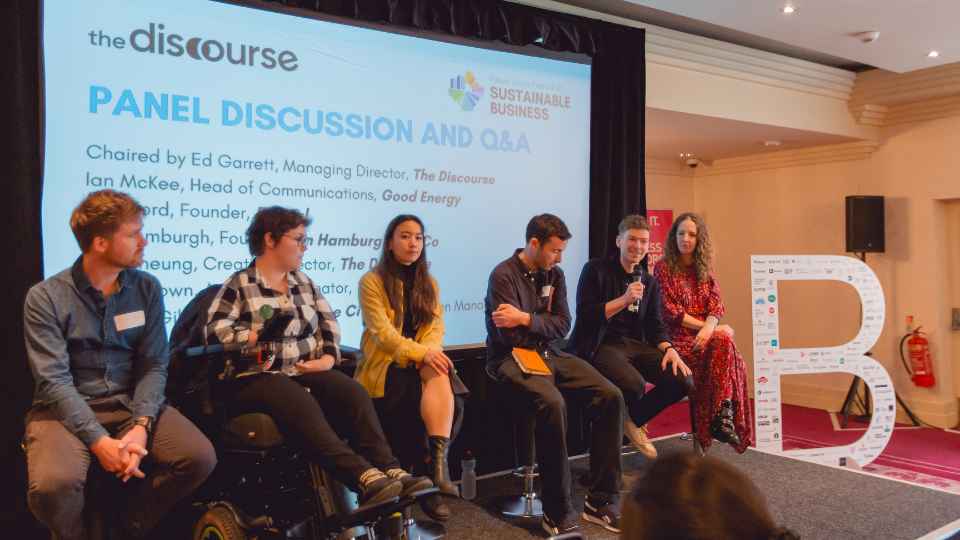
B in the Know: The Routes and Benefits to Becoming a B Corp
March at Future Leap with Alan Bailey
February at Future Leap with Katherine Piper
“Just being 100% renewable in itself was a piece of activism”
Shouting Sustainability from the Rooftops with Molly Byrne
January at Future Leap with Katherine Piper
December at Future Leap with Katherine Piper
Future Leap News: November
Future Leap News: October
September at Future Leap with Keryn Seal
Grant Funding and Debt Finance: Affordability of SME Net Zero Journeys
Rin Hamburgh’s Perspective on Brand Activism – An Interview by The Discourse
The Discourse interviewed Rin Hamburgh, Founder of Rin Hamburgh & Co, to hear her insights from the Festival of Sustainable Business 2024!
Thank you to The Discourse for their generous sponsorship of Future Leap’s second seminar, ‘Leading Change: Brand Activism, Communications, and Business’, during the conference. We were thrilled to have Rin Hamburgh & Co contribute to this seminar and serve as our communications sponsor for the 2024 festival.
What was your highlight from the conference?
My highlight from FoSB was meeting such a diverse range of people and organisations, all doing something positive for the future of our planet and society. As individual people and businesses we can’t do enough but working together, I believe that we can, and this event left me feeling hopeful and motivated for the future.
What were you most excited to learn about at the conference?
I was excited to learn about the Kerbo Charge product that allows people to charge EVs even without a driveway, by creating a channel for the power cable through the pavement outside their house. Innovation like this is what’s needed, to make sustainable choices easier and more accessible for people.
What is your key takeaway from the seminar on brand activism?
Every brand can be involved in making the world a better, fairer, more equitable place. For some that will look like brand activism, for others it might just be about consistently and authentically putting values into action. Whatever the case, we all need to work together to protect and care for our planet and its people.
Why did you pick the topic for your seminar presentation?
As well as being a B Corp ourselves, we’ve been working in the sustainability space for some years now and have found that the same challenges come up for clients again and again. I wanted to use this opportunity to share what we’ve learned about how to overcome them, so that more values-led businesses and organisations can use communication to its full potential and build their reputation and their impact for good.
What do you hope people will take away from your seminar presentation?
I hope it will be a combination of understanding and empowerment when it comes to communicating sustainability and impact. I always like to make talks practical so that people feel they not only want to put what they’ve learned into practice but believe they can actually do that.
What three words would you use to describe your seminar presentation?
Down-to-earth, accessible and encouraging. I want people to feel like it’s ok to struggle with this stuff, to realise that other people are struggling with the same things, and to learn that there are ways to overcome those challenges.
What does ‘Leading Change’ mean to you?
I think it means being willing to stand up and be counted – wherever you are, whatever steps you’re taking. It doesn’t have to be about being up at the front, doing the ‘big things’ or more than the next person. We can all lead, and we all should. It’s not a competition. We will only overcome the challenges we face as a society if we work together.
What does ‘Brand Activism’ mean to you?
This is a tougher one for me, because activism can have negative connotations. It has traditionally been quite aggressive, loud and extroverted in its actions. When you combine that with the idea of ‘brand’ – which can in itself feel quite commercial and capitalist – there are all sorts of potential pitfalls. That said, if you take brand activism at face value, it’s really just about brands taking a stand to do things differently, and that’s something I’m very much for.
Should businesses engage in social and environmental issues?
Yes. We should all be doing everything we can, in whatever space we exist, to drive positive conversations and behaviours forward. What I don’t think all businesses should do though, is make it a core part of their value proposition or their marketing. Positive action shouldn’t be a primarily PR-led exercise. Talk less, do more.
Do businesses need to apply more urgency in their sustainability work?
Some do – those that aren’t yet stepping up in the way they should. Others are already working really, really hard. I think it’s important that we don’t have one message for everyone because otherwise we risk putting so much pressure on those that are already doing all they can, that they end up burning out and giving up. In my experience, small businesses are carrying a far greater load than enterprise level businesses, relative to their size.
What books or resources would you recommend that people read if they want to find out more on these subjects?
I love the book Everyday Activism by Rachel England – it’s a small, easy-to-read book that breaks down the actions we can all take, from super small to more challenging, and leaves you feeling inspired and empowered to do more. I also love Positive News for counteracting the overwhelm and showcasing some of the incredible individuals, organisations and businesses who are already making a difference. We need more positive examples and signposting in the world to counteract the fear-based media majority that can leave us feeling too disheartened to act.

